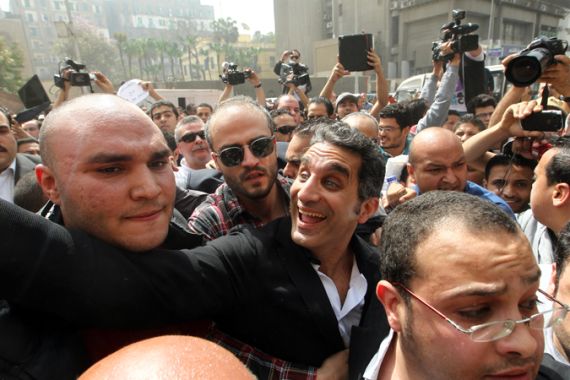Egypt ends jail terms for insulting president
Decree by interim president Adly Mansour reduces punishment to a fine; rights groups say measure does not go far enough.

A decree issued by Egypt’s interim head of state means people no longer face jail for insulting the president, after a surge in such cases under deposed leader Mohamed Morsi.
The legal change by interim president Adly Mansour was welcomed by activists, who had voiced concern over the high number of investigations during Morsi’s one-year rule, which ended when he was toppled by the military on July 3.
But Human Rights Watch said the Monday decree did not go far enough, arguing that insulting the president “should not be an offence in the first place”.
Several Egyptians were investigated for insulting Morsi during his brief term in office, fuelling fears that he was trying to crush freedoms won in the 2011 uprising that ousted veteran autocrat Hosni Mubarak.
The most high-profile case was that of Bassem Youssef, a popular comedian, who regularly poked fun at Morsi.
The prosecutor general ordered Youssef’s arrest in March, drawing criticism from Washington, but he was eventually released on bail.
‘A good step’
The army removed Morsi from power following mass protests against his rule and replaced him with Mansour, the head of the Supreme Constitutional Court.
This amendment, while a general step in the right direction, doesn't go anywhere near far enough.
Under the decree, those found guilty of insulting the president face a fine of up to 30,000 Egyptian pounds ($4,300).
Under the previous law, they could be jailed for up to three years.
“We were hoping [such cases could be dealt with] through civil litigation and compensation, not fines, but it is still a good step,” said Gamal Eid, a veteran human rights lawyer. “We are against imprisonment and we prefer no criminal courts for publishing crimes.”
He added the 28 cases of “insulting the president” brought during Morsi’s year in office compared with a total of 24 cases over the 115 years that preceded his election win last June.
Many of the cases were brought by private citizens sympathetic to Morsi and his Muslim Brotherhood.
The Egypt director at Human Rights Watch, Heba Morayef, called on the interim leadership to go further.
“This amendment, while a general step in the right direction, doesn’t go anywhere near far enough, because it doesn’t address the multiple provisions in the penal code that limit freedom of expression,” she told the Reuters news agency.